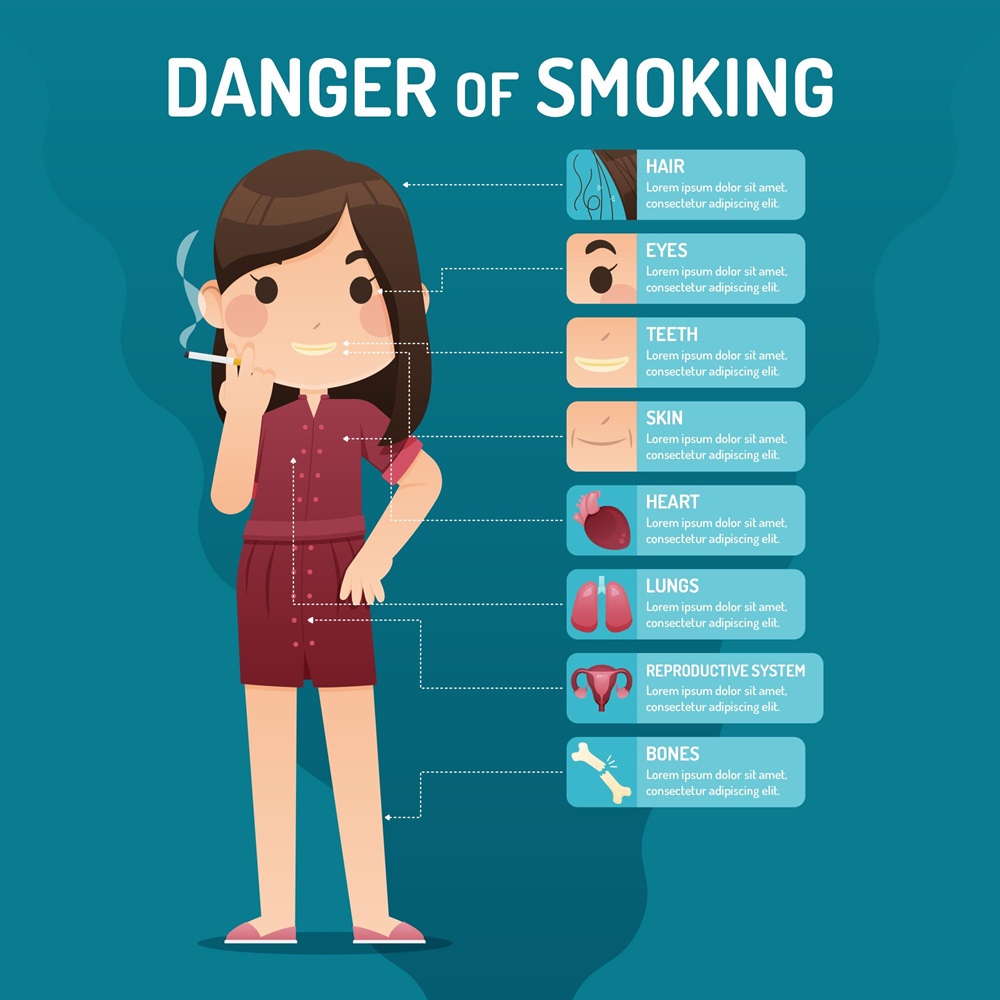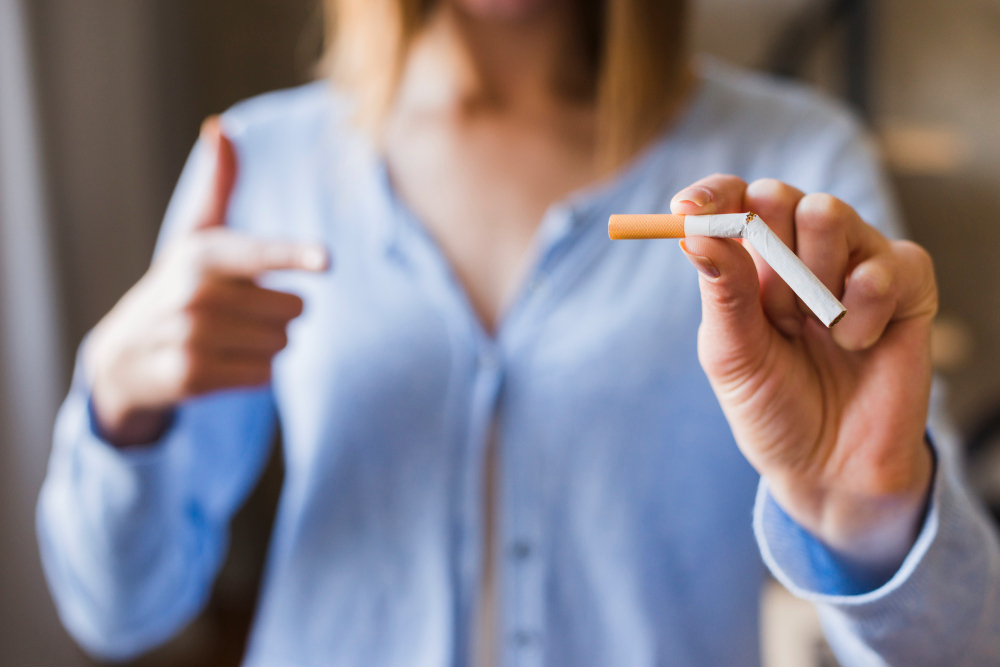It is no new fact that chronic smoking can affect human health in more than one negative way. Carcinogens detected in smoke can increase the risk of premature ageing, chronic illnesses, and cancer and can even cause premature death.
When we talk about smoking effects on the skin, the list is a long one. Intake of nicotine from smoking can trigger psoriasis, hidradenitis suppurativa, chronic dermatoses, alopecia, lupus erythematosus, polymorphous light eruption, skin cancer and tobacco-associated oral lesions, which could be pre-cancerous. Some other cigarette effects on the skin are premature ageing, triggering skin inflammation and causing acne, and delayed wound healing.
When we are talking about smoking and its effects, one common question we often ask is, “does smoking affect skin”? Let us discuss in detail the effects of smoking on hair.


One of the alkaloids in tobacco is nicotine, which is easily absorbed into the respiratory tract, skin and intestinal mucosa. It is metabolised through the liver to active metabolites. It is quite addictive. It can react with different nicotinic acetylcholine receptors located in the brain, adrenal medulla, skin and inflammatory cells like monocytes and dendritic cells. Nicotine can pass into the human body through smoke inhalation, ingestion, intranasal spray, transdermal patch, topical cream, or enema.
In the skin, it increases keratinocyte (skin cell) adhesion and upward migration of epidermal cells. Nicotine side effects on the skin not only lead to increased keratinocytosis but also modify the cell structure over the long term.
It does have a gender association. Women who smoke are at higher risk of morbidity or mortality when compared to men who chronically smoke.
Nicotine constricts blood vessels, reducing blood flow to skin and hair follicles, which leads to premature aging and hair thinning. It also impairs collagen production, causing wrinkles and loss of skin elasticity. Additionally, nicotine can contribute to dry skin, delayed wound healing, and increased risk of hair loss and graying.
Smoking is an absolute risk factor for wrinkles and premature skin ageing. This negative cigarette effect on skin was discovered more than 150 years ago. The pathogenesis is a multifactorial one for smoke induced ageing. Smoking can affect reticular dermis by decreasing the number of elastic fibres. It can lead to the activation of metalloproteinase which can cause degradation of collagen, elastic fibres and proteoglycans. Smoking can also reduce the level of active form of the transforming growth factor β (TGF-β1) and down-regulate their receptors causing dysfunctions of tissue remodelling and repairing. An in vivo study showed that mice treated with intracutaneous or topical tobacco smoke can have a decreased level of type I collagen.
A “Smoker’s face” presents with some characteristic features such as prominent wrinkles, prominence of underlying bony contours and grey-coloured, atrophic complexion of the skin. Ageing is correlated with pack-years of smoking and number of cigarettes smoked per day. Studies confirmed the association especially with more than 40 packs smoked per year.
By reducing the activity of fibroblasts, it reduces their migration to site of wound and delays the healing process. It can also lead to wound dehiscence, an increased chance of infection at the site of wound. Pre-surgery and post-operation recovery it is best to avoid smoking to avoid post-operative complications.
Smoking is an undeniable risk factor for androgenic alopecia among men. Studies showed that smoking over 20 cigarettes per day can be associated with developing moderate to severe androgenic alopecia
Nicotine side effects on hair can cause microcirculation dysfunctions among hair papilla. Cigarette smoke is a source of substances that can cause DNA mutation. Studies revealed that smoking can affect the balance between proteases and antiproteases. Moreover, it can increase pro-inflammatory cytokine concentration in anagen hair which can lead to follicular microinflammation and fibrosis. Thus, leading to alopecia.
Cigarette smoking can significantly exacerbate psoriasis, a chronic autoimmune skin condition characterized by red, scaly patches. The harmful chemicals in tobacco smoke trigger inflammation and oxidative stress, worsening psoriasis symptoms and increasing the risk of developing the condition. Nicotine, in particular, affects skin cell growth and immune function, potentially leading to more frequent and severe psoriasis flare-ups.
Smoking also impairs the skin’s ability to heal, making psoriasis treatments less effective. Moreover, it can interact negatively with certain psoriasis medications, reducing their efficacy. The combination of these factors often results in more extensive and persistent psoriatic lesions in smokers compared to non-smokers.
While smoking side effects on the skin don’t directly darken the skin, it can lead to a dull, greyish complexion and uneven skin tone, often referred to as “smoker’s face.” This effect is primarily due to the numerous harmful chemicals in cigarette smoke that damage collagen and elastin, crucial proteins for maintaining skin elasticity and brightness.
Cigarette effect on the skin causes constriction of blood vessels, reducing blood flow to the skin and depriving it of oxygen and essential nutrients. This can result in a pale, sallow appearance. Additionally, smoking accelerates the ageing process, causing premature wrinkles and age spots, which can contribute to an overall darker or more uneven skin tone.
The repetitive facial movements associated with smoking, such as pursing the lips, can also lead to increased wrinkles around the mouth and eyes, further affecting skin appearance.
Cigarette effects on the skin can trigger psoriasis and chronic dermatoses. In certain studies, it has proven to be a risk factor for skin cancers like squamous cell carcinoma and keratoacanthoma and certain anogenital cancers.
There is no debate about whether smoking has a negative impact on human health or not. What remains important is that for good health, it is best to stay away from a habit like smoking which can be highly addictive and is a risk factor for multiple diseases.
On that note, it is wise to say one of the best things for healthy skin is to quit smoking and use good sunscreen.
Smoking significantly impacts both hair and skin health. It reduces blood flow, depriving these tissues of oxygen and nutrients. This can lead to premature aging of the skin, causing wrinkles and a dull complexion. For hair, smoking can damage follicles, leading to thinning, graying, and even hair loss. Overall, smoking accelerates aging processes in both skin and hair.
Smoking damages skin in multiple ways. It constricts blood vessels, reducing oxygen and nutrient supply to skin cells. This accelerates aging, causing premature wrinkles and a dull, grayish complexion. Smoking also breaks down collagen and elastin, crucial for skin elasticity. It increases the risk of skin disorders like psoriasis and delays wound healing. The repetitive facial movements while smoking contribute to additional wrinkles.
Yes, quitting smoking can significantly improve your skin. Within weeks, blood flow increases, enhancing oxygen and nutrient delivery to skin cells. This can lead to a brighter complexion and a more youthful appearance. Collagen and elastin production may improve, potentially reducing the appearance of fine lines. While some damage may be permanent, stopping smoking can prevent further deterioration and allow your skin to heal.
Secondhand smoke can indeed affect hair health. The toxic chemicals in cigarette smoke can settle on hair, leading to an unpleasant odor and dull appearance. Prolonged exposure may damage hair follicles, potentially leading to weakened hair structure and increased hair loss. While the effects may be less severe than for active smokers, consistent exposure to secondhand smoke can still negatively impact hair quality and growth.
Categories: Dermatology
Smoking and its effects on skin and hair is available for appointments. Please fill the below form to book an appointment.
Unlock the door to exceptional healthcare, book an appointment with SPARSH Hospital and let your journey to wellness begin.